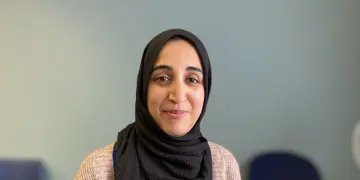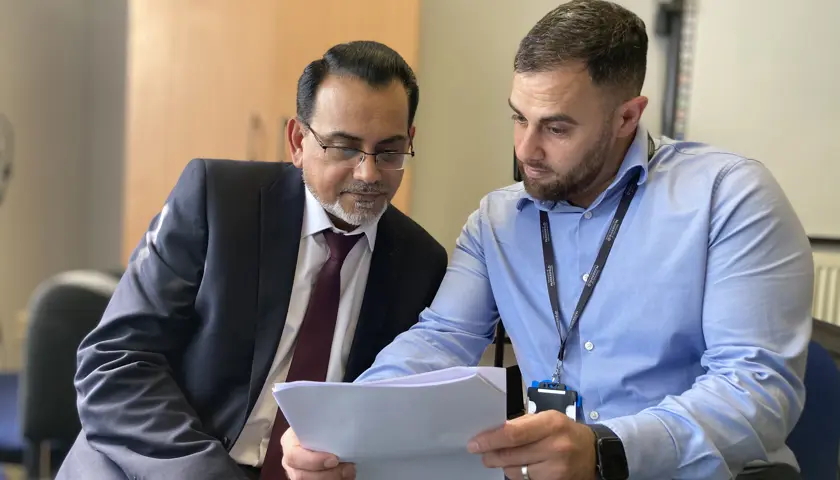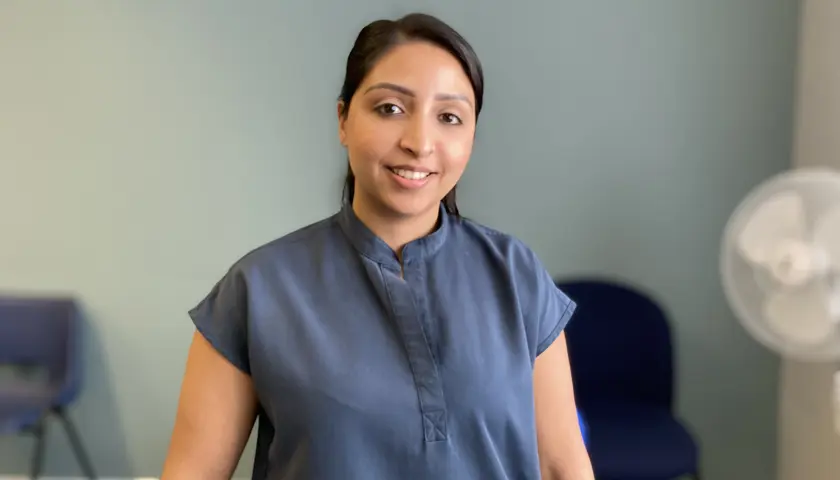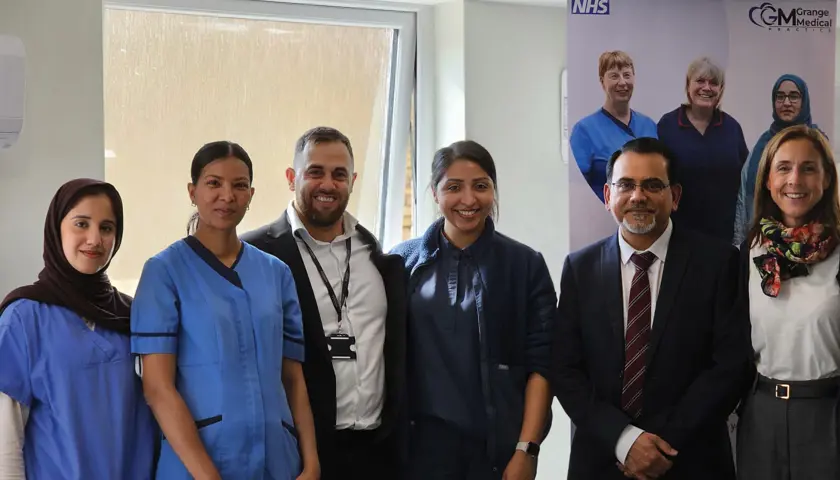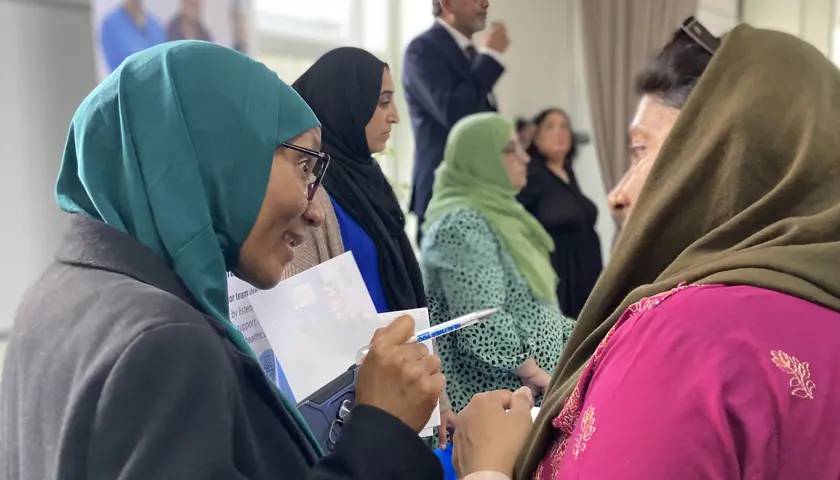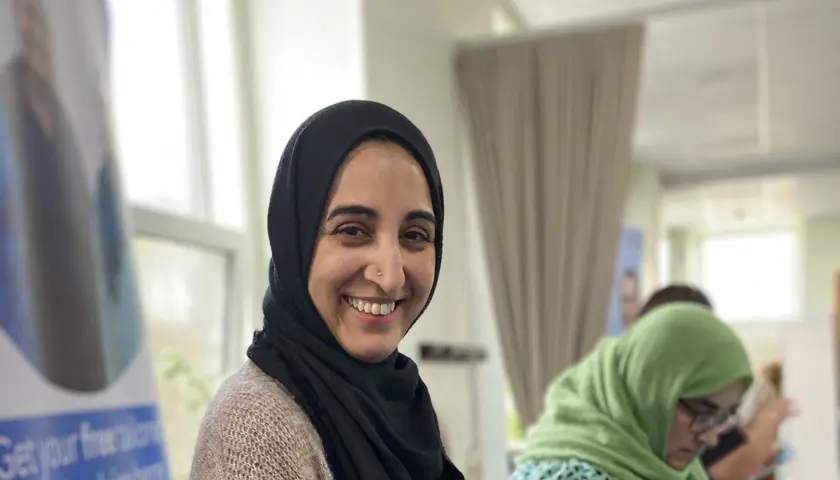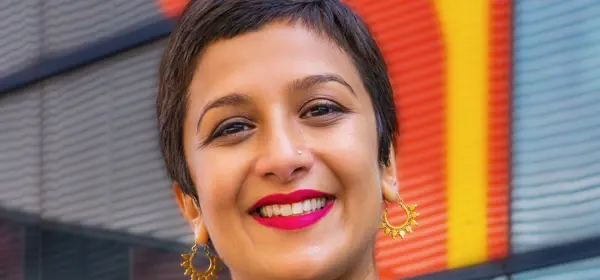You’re welcome
You’re welcome
A ‘nurturing’ GP practice shows Seren Boyd how it seeks to reassure, gently challenge, and communicate sensitively with its patients in a bid to tackle deep-rooted health inequalities
Naila Parveen is amused; a patient has just chided her for not knowing their date of birth from memory. There are 16,800 patients on the register at the Grange Medical Practice in Huddersfield.
As reception team leader, Naila (pictured above) knows most of the regulars by their first names. But they expect a lot of her.
It is perhaps not surprising. Many are seeking reassurance: she is keen to help. She will often take a patient into the little side room by the reception desk if they’re struggling to understand or be understood.
She will gently encourage new patients to try to speak in English while assuring them she speaks Urdu and Punjabi.
They relate to her, especially women of South Asian heritage, not just because Naila is from their community but because she tries to put herself in their shoes. They remind her of her mother, who arrived in the UK with no English and who has sometimes found it hard to adjust.
When I’m with anyone who’s struggling, I always go back to my [mum’s experience]
Naila Parveen
‘When I’m with anyone who’s struggling, I always go back to my [mum’s experience],’ Naila says. ‘You don’t judge.’
Healthcare can be daunting, especially when you lack confidence in yourself or the system. Worse still if you’re discussing it in your second or third language.
‘If you’ve gone shopping and asked for chips, and they give you a potato, it’s OK: you can just go around the aisles and look for the right thing,’ Naila explains, with her ready smile. ‘But with your health, you really don’t want to say the wrong thing or be misinterpreted.’
Health inequalities
(‘Dav’) Singh is doing an MBA and enjoys number-crunching, but the data has been worrying him for a while.
The Grange scores highly now in patient satisfaction – but some of the stats on the local GP data dashboard are still not healthy, neither for the Grange nor the Greenwood PCN (primary care network).
Coverage for breast screening (61 per cent) and cervical screening (73 per cent) is in the red. Prevalence of diabetes is drifting higher.This is particularly concerning in the predominantly South Asian neighbourhoods of Birkby and Fartown, which the Grange serves, when South Asians are at much greater risk of developing type 2 diabetes than the general population. National health inequalities affecting ethnic minorities are writ large in these tight, terraced streets.
This area in north Huddersfield’s green belt also has sizeable white, Afro-Caribbean and Eastern European populations – and high levels of deprivation.
So, the word ‘engagement’ peppers most conversations between Dav and the team.
Last week, they prepared a special outreach event after Friday prayers at Masjid Riza, one of four mosques within a short walk of the surgery. Everyone was invited but the South Asian community were most likely to attend.
Ankit Telang, who covers social media and marketing, was busy designing flyers promoting screening and health checks.
Driving this ‘health seminar’ at the mosque is Ilyas Ahmad, one of the seven GPs at the Grange. Dr Ahmad’s spoke to local Radio Sangam, drawing in other services, drumming up support – and he was excited.
Our South Asian community is quite private so sometimes they’re late in coming to us
Kathryn Iredal
Until early 2023, he was a single-handed GP with little time to look at bigger-picture approaches. But now that he is part of a larger team and a ‘very nurturing’ practice, he feels it is his chance to ‘make a difference’. In the colourful, airy reception space, a banner introduces him as health inequalities lead.
Dr Ahmad grew up in Birkby and has worked in Huddersfield for almost 20 years. ‘My community invested in my education, they looked after us, so now we look after them,’ he says.
Preventive checks
Prevention is to be the focus of the mosque event: breast, bowel and cervical screening; prostate cancer awareness; early detection of diabetes; free NHS health checks.
Dr Ahmad is passionate about this stuff: his own father suffered a ‘dramatic change in his health’ at a young age which, he believes, could have been prevented if symptoms had been detected earlier.
Unsurprisingly though, preventive checks can be problematic – especially on ‘private areas’ of the body – in cultures that prize modesty and chastity. Practice matron Chris Roberts often finds herself correcting misconceptions that breast screening, cervical screening, even HPV vaccines are only for the sexually active.
What is more, the purpose of these checks, says Dr Ahmad, is not easily grasped by some in his South Asian community. ‘It’s still a very common belief that you only go to the doctor when you’re not feeling well.’
Naila thinks fear also plays its part. ‘If you explain cervical cancer screening to somebody, they might say: “What? You’re saying I’ve got it?” Within Asian communities, the word cancer is massive.’
For older generations, even being seen at a surgery or clinic can suggest you are in some way ‘defective’ – and this stigma can be bad for your health too.
‘I hear it all the time: people worried about “bad vibes”,’ says Pavanjit (‘Pav’) Kaur, who’s one of three ANPs (advanced nurse practitioners) at the Grange. A close relative has just gone through a lumpectomy, chemo and radiotherapy without telling even her best friends during treatment.
Sadly, as a result, people hang back, says ANP Kathryn Iredale, who is head of nursing and quality. ‘Culturally, our local South Asian community are quite private so sometimes they’re quite late in coming to us.’
Nationally, higher rates of late-stage diagnosis for breast, ovarian, uterine and colon cancers are reported for Black and Asian women compared with white British women.
We work with leaders and known people in the communities so that messages are trusted
Julie Stein Hodgins
Pav still does cervical screening even though it is not part of the ANP role; she invites the hesitant in to see the equipment and ask questions.
The Grange recently set up an online portal where patients can book a smear test with the nurses of their choice. Having nurses of different ethnicities – for those who want to see someone from their community and for those who definitely don’t – is reassuring, they tell Naila.
‘And I’m here if you need me to come in with you,’ Naila replies.
Oil, butter and chapattis
An altogether less intimate subject such as diabetes and cardiovascular disease should perhaps be easier to broach, but here too cultural complications arise.
Everyone at the practice agrees a diet rich in starchy carbs is not helping, although genetic factors also come into play. Chapattis are not the diabetic’s friend.
Pav often has to gently dissuade women of the idea that it’s enough just to make more vegetarian curries. ‘Actually, all the oil, butter and salt that’s gone into that curry is not fine,’ she says, ‘but that recipe’s probably been passed down three generations.’
Naila has the same challenge. ‘It is not that people won’t change; it is that they don’t know how to. Get my mum to make a feta salad, she has no idea, but she’ll spend five hours making you a curry.’
It’s not as simple as suggesting tweaks to the family meal plan, however.
Women may have little say in the food they serve or portion size, especially if they live with their in-laws. ‘In surgery, we’re perhaps telling her: “You don’t need carbs, chapattis or rice”,’ explains Dr Ahmad, ‘but then she goes home and the whole family wants that.’
Community traditions around food are hard to disrupt too, Pav says. At her Sikh temple, she would not dare suggest changes to traditional recipes – or refuse food at langar, the meal after Sunday prayers. ‘You need a nap afterwards,’ she says.
For similar reasons, Chris has had requests for medication to reduce fat absorption from patients preparing for weddings. She has gently declined them.
Getting out to exercise is also hard for women whose role has traditionally been caregiver and homemaker, says Naila. She takes her mum out for power walks but generally, ‘women don’t get much time for themselves’.
Dr Ahmad agrees: ‘I can just go and join the gym tomorrow. But women may need permission from someone. They may be asked about what they’ll wear, why they’re going. It’s complex.’
Early diagnosis
Diabetes awareness is spreading slowly, though there is much deeper work to be done to persuade the whole community – and gain elders’ endorsement – to start shifting the stats.
Early diagnosis is key. A recent phone campaign promoting general health checks at the Grange helped unearth 70 new pre-diabetic people in the last quarter; 44 per cent of patients coming in for health checks are now Black, Asian and minority ethnic.
But it is harder to help people with conditions they don’t or won’t recognise. Mental health issues are common in South Asian communities, says Dr Ahmad, but stigma is strong.
Naila, who was born in the UK, is fond of her in-laws and lives independently of them but joining your husband’s household can be a huge adjustment, she says. Especially if that involves moving to a new country where you don’t speak the language.
She worries about the older generation too, including those who still divide their time between Huddersfield and their country of birth: they may miss home, feel isolated, find British culture difficult. ‘They’ve got so used to hiding away it is very hard for them to open up.’
The strong family culture means people tend to lean heavily on their community for support; women may rely on others for information too.
These may be some of the reasons the South Asian community in Kirklees borough tend not to be as well connected with support services, for learning disabilities for example.
Staff at the Grange find carers are often struggling to cope alone, unaware of benefits and help they can draw on. Chris, who has caring responsibilities of her own, always asks: ‘Who else have you got living with you?’
The Grange has two designated care coordinators who connect patients with wider support networks and check in with them regularly. One of them, Tehmina Shah, speaks Urdu.
Naila has recently taken into the side room a patient who couldn’t explain what was wrong, except she was ‘finding it hard to leave the house’.
These so-called ‘complex queries’ take time and Naila’s to-do list often doesn’t get done. But Dav is understanding: ‘We are all about the patient.’
Mosque visit
The day of the mosque visit arrives and the team learns that Jummah (Friday prayers) will coincide with a funeral so there should be far more women attending than normal.
Mosque protocol dictates there should be separate stands for men and women, in different rooms. This will help with delivering information direct to its intended targets.
Since the idea of this event was first floated, the Grange has reached out to many different organisations and services.
Dr Ahmad is clear: the event is promoting services across the PCN and beyond. The driver behind the push to tackle health inequalities is the West Yorkshire ICB, he stresses; the Grange can’t do this alone.
As prayers from the main hall echo across the intercom, public and voluntary sector associates share learning and ideas in a chair-lined side room.
They’ve got so used to hiding away it is very hard for them to open up
Naila Parveen
Julie Hunneybell, health improvement practitioner (advanced), Kirklees Council’s public health team, mentions that bowel screening take-up among the South Asian community has risen since the test was changed from three samples to one.
Her research has found the barriers to screening to be complex: the word ‘breast’ on a mobile screening unit can be off-putting for some, she adds.
Julie Stein Hodgins from Pennine Breast Screening feels a more ‘inclusive or easy-read version’ of the standard NHS screening invitation could more clearly spell out that the staff are female and the procedure is quick. ‘We work with leaders and known people in the communities so that messages are trusted,’ she says.
ANP Kathryn relishes these networking opportunities. Twenty years ago, when she joined the Grange, district nurses were based in the building and health visitors came in for clinics. ‘Now, to reach out to the 0 to 19 team, it’s a telephone call, a referral, a task,’ she says.
But she feels there is a renewed push, post-COVID, to reconnect. ‘There’s more awareness now that people are not accessing services and a massive drive to do something about it, because the health inequality gap is just getting bigger.’
Lemons and leaflets
As prayers end, the teams take up position around the information tables.
In the women’s room, the assembled congregation cluster around to examine crocheted breasts or handle lemons, pips a metaphor for lumps. Children and bowls of curry weave around them.
There is close questioning about process and purpose – but lots of Ankit’s leaflets are secreted into handbags.
Mosque member Asiah Zulfiqar, who helped coordinate the event, is pleased with the response.
‘Generally speaking, many people are wary about having their health checks as I feel that they are afraid about any possible outcome,’ she says. ‘Reassurance needs to be given. I believe there should be more seminars like this, as many people feel safe to get themselves to open up and communicate with the health team.’
It’s becoming clear that outreach is not just clinicians telling prospective patients what to do. As Naila says, ‘you have to listen’, then respond in ways that are culturally sensitive and meaningful.
‘When I first began this journey,’ says Dr Ahmad, ‘my focus was on raising awareness and providing educational sessions. But we must also simply listen, giving voice to the people’s experiences and challenges. Hearing their stories will help us better understand their needs, provide more effective support, and create an environment of trust and empathy.’
Back at base, there are many other ideas banking and circling in the Grange’s upstairs meeting room.
You build a relationship and they learn to trust you
Pavanjit Kaur
The team already has an invitation to run its next health seminar at the local Sikh temple: they got in touch after hearing Dr Ahmad promoting the mosque event on local radio. The plan is to have similar outreaches regularly, rotating around different community venues.
The website now has ‘You said, we did’ and ‘Tackling health inequalities’ pages.
And Dav’s considering an ‘Apple shop-style event’ where older people could be taught how to use iPads to access records or services digitally. ‘We need to think seriously about that,’ he says. There’s no doubt he will.
Pav is thrilled her relative, who was so reticent about sharing that she was unwell, is positively enthusiastic about screening since she has had the all-clear. ‘When she went back to temple, she was telling her friends all about it,’ she says.
‘People are on a journey with us in primary care. You build a relationship and they learn to trust you. But it takes time.’
Heading back to his clinic, Dr Ahmad is adamant this is just the start. ‘If we can make a difference in one life, we’ve done our job. But we will continue.
‘Before, I felt like a seed in the grass. Dav and the team have made that seed into a plant, which is only going to spread and become a garden.’


